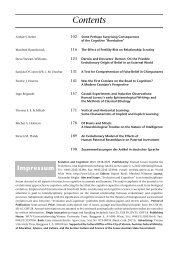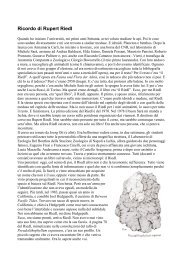The Seven Sins of Evolutionary Psychology - Konrad Lorenz Institute
The Seven Sins of Evolutionary Psychology - Konrad Lorenz Institute
The Seven Sins of Evolutionary Psychology - Konrad Lorenz Institute
You also want an ePaper? Increase the reach of your titles
YUMPU automatically turns print PDFs into web optimized ePapers that Google loves.
A Continuing Critique <strong>of</strong> <strong>Evolutionary</strong> <strong>Psychology</strong>thinking about mechanisms <strong>of</strong> selection. Henceforth,we will refer to selective processes that operateon neuro/behavioral systems that only function successfullyin such groups as social selection (not to beconfused with group selection although there is thepossibility <strong>of</strong> linkages).It is clear that the study <strong>of</strong> intrinsic social processeswas massively marginalized during the previouscentury. Anyone that has spent time studyingsuch matters should recognize that many socio-affectiveprocesses can only operate within groups.Normally, one cannot tickle themselves or sociallyplay alone, and one can only deeply grieve for theloss <strong>of</strong> another, but not as much for material losses.A preliminary characterization <strong>of</strong> the underlyingbrain systems has been achieved for some <strong>of</strong> theseneural processes (PANKSEPP 1998a), but there hasbeen massive resistance in psychological and neurosciencecommunities for pursuing such topics <strong>of</strong> ultimateconcern. Many still assert that specific socialaffects do not exist—that they are all learned or sociallyconstructed. This is most certainly wrong,even though all the details <strong>of</strong> our social existence aresurely learned. And when we have the conceptualliberties that the human-type cortex allows, we canobviously choose to go against the dictates <strong>of</strong> thesesystems. We are perhaps the only species that has theoption <strong>of</strong> being libertarians.Our advocacy <strong>of</strong> the social selection hypothesiswas advanced largely to help open scientific inquiryinto the many unstudied mysteries that exist in allmammalian brains. We should not close our mindsto reasonable possibilities because <strong>of</strong> the appealingrigor <strong>of</strong> certain mathematical equations. Whether insome instances social selection and group selectionexert a synergistic pressure on certain brain functionsremains an intriguing possibility. While it continuesto be only a possibility for other species, wefeel that it is in fact very plausible that group selectionhas already occurred in our own species. However,the important distinction is that such selectiveprocesses may have been driven primarily by culturalevolution and not by biological evolution (justconsider the caste systems in some cultures, not tomention the holocausts that have been inflicted onothers). It seems intuitive that gene frequencies andthus collective genomic phenotypes can be alteredby seemingly capricious cultural choices. <strong>The</strong> potentialgrouping <strong>of</strong> genes in human beings will be asunpredictable as their new selective force—culture.<strong>The</strong>re should be no reason why this cannot be accepted,without moral exacerbation, as an emergentproperty <strong>of</strong> the interactions between dedicated brainoperating systems, flexibly non-dedicated systems(where emergent properties can also be exquisitelyhoused), environment and culture. It is within suchrealms where the concept <strong>of</strong> developmental programswill become most robustly manifest. Cortico–cultural evolution has obviously provided a new andall too <strong>of</strong>ten terrible order to the evolved dynamics<strong>of</strong> the mind/brain (PETERSON 1999), and <strong>of</strong> course,the genes have also played their part. Fortunately, westill have the hope <strong>of</strong> better educating our highercerebral systems.Behavior Genetics—An Essential KeyIt is understandable that evolutionary psychologistsdid not want to get entangled in the genetic determinismthat has historically colored sociobiologicalthought. However, there is no intellectually-soundreason to be coy about this topic. Genes are obviouslyoverwhelmingly important in the way themind/brain is constructed as is epigenetic development.To think otherwise is to indulge in politicizednonsense.<strong>The</strong> robust heritability <strong>of</strong> a majority <strong>of</strong> humanpersonality traits is stunning, while there is very littleheritability for the specific things we do in ourenvironments. For years, BOUCHARD (1998) has beenfinding clear evidence for ‘nature’ in the construction<strong>of</strong> human personality, while the role for ‘nurture’has gotten slimmer and slimmer (almost nonexistentby some <strong>of</strong> his most recent ‘adoptees raisedin the same environment’ analyses). Namely, identicaltwins reared apart show the same reasonablyhigh degree <strong>of</strong> heritability on practically all traits asdo twins reared together (r’s typically between .4 and.6), while two unrelated adoptees raised in the samefamily exhibit practically zero correlation on suchtraits (BOUCHARD personal communication withJ.P.). Also, it is becoming clear that our genetic dispositionshelp us actively create social and materialenvironments that are satisfying or less distressing.Yet, no one knows what has really been selected forat the genetic level, but we suggest that at a systemslevel, it is the vigor <strong>of</strong> certain basic motivational,emotional and attentional functions. We will notdwell on these important issues since they have beencovered so well elsewhere (BOUCHARD 1998), but willshare one striking recent example:BOUCHARD’s most recent work on religiosity wasinitially a bit <strong>of</strong> a mess until he broke it down intointrinsic and extrinsic religiosity. <strong>The</strong> intrinsic variety(e.g., spirituality?) had a high genetic loading,while the extrinsic variety (e.g., church attendanceEvolution and Cognition ❘ 75 ❘ 2001, Vol. 7, No. 1








